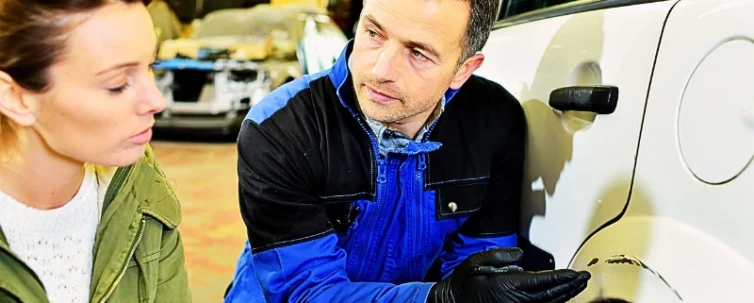After an accident in Chicago, you’re likely dealing with physical pain, property damage, and mounting stress. When an insurance adjuster calls requesting a recorded statement, your first instinct might be to cooperate fully. However, giving a recorded statement to an insurance adjuster—especially one representing the other party—can seriously jeopardize your claim and your right to fair compensation.

Insurance companies are in the business of minimizing payouts. Anything you say—even something seemingly harmless—can be used against you to reduce or deny your claim. In fact, insurance adjusters are trained to spot inconsistencies, shift blame, and create doubt.
The bottom line: You are not legally required to give a recorded statement to another party’s insurance company, and doing so often works against your best interests. Before you even talk to the insurance company, contact the car accident lawyers at Lloyd Miller Law Group in Chicago.
Table of Contents
Watch: Legal Advice on Giving Insurance Statements
Key Reasons to Avoid Recorded Statements
It’s critical to understand your rights, the risks involved, and why you should think twice about giving a recorded statement.
- Anything You Say Can Be Used Against You
You might think you’re being helpful, but your words can (and will) be twisted. Innocent descriptions of pain or confusion? They’ll likely be turned into “pre-existing condition” or “lack of severity.”
- Insurance Adjusters Are Trained to Trap You
Adjusters aren’t your friends. Their goal is to find holes in your story, contradictions in your memory, or vague statements they can spin. Recorded statements make it easier for them later.
- A Statement Could Limit Your Legal Options
Without legal guidance, you may inadvertently waive rights or hamper your future ability to fight for fair compensation — even if your case goes to court.
- Misinterpretation Could Cost You Maximum Compensation
A single offhand comment about “feeling better” can lead them to argue that you’ve recovered fully and onward compensation is unwarranted. Why take unnecessary risks?
What Insurance Adjusters Really Want From Your Statement
Insurance adjusters are trained professionals working to minimize their company’s financial liability. While they may sound friendly and helpful on the phone, their primary goal is to protect their employer’s bottom line—not to ensure you receive fair compensation for your injuries and damages.
When an adjuster requests a recorded statement, they’re looking for:
- Contradictions they can use to dispute your claim later
- Admissions of fault or partial responsibility for the accident
- Minimizations of your injuries or their impact on your life
- Inconsistencies between your statement and other evidence
- Information they can take out of context to reduce settlement offers
The Legal Reality: You Don’t Have to Give a Statement
Under Illinois law, you have no obligation to provide a recorded statement to the other party’s insurance company. The insurance company’s adjuster doesn’t want you to know that. In fact, they will do everything they can to try to get you to talk about the accident. Sometimes, the tactics they use are pretty drastic.
They’ll try calling you right after your crash, before you’ve had a chance to realize how serious your injuries are. They’re probably going to try getting a statement from you when you’re caught off guard or not thinking clearly because of medications. Make no mistake— the adjuster isn’t afraid to apply pressure, either. Sometimes, they have been known to “demand” information from injured victims.
How Recorded Statements Can Damage Your Case
Even the most well-intentioned accident victims can inadvertently harm their claims through recorded statements. Here’s how:
The Shock and Adrenaline Factor
Immediately after an accident, you may not fully understand the extent of your injuries. Adrenaline and shock can mask pain and symptoms that don’t become apparent until days or weeks later. If you tell an adjuster you “feel fine” in the immediate aftermath, they may use this against you when you later seek compensation for injuries that developed over time.
Memory and Stress Issues
Traumatic events can affect memory and perception. Under stress, you might:
- Misremember sequence of events
- Admit uncertainty about details
- Provide incomplete information
- Say things you don’t mean to say
Leading Questions and Tactics
Experienced adjusters know how to ask questions that elicit responses favorable to their company:
- “You weren’t really going that fast, were you?”
- “The intersection was pretty clear, right?”
- “You were probably distracted by your phone?”
These seemingly innocent questions can trap you into making statements that undermine your claim.
What Should You Do If the Insurance Adjuster Contacts You?
If the other party’s insurance company contacts you for a recorded statement, you have a few options. You can politely decline the request, refer them to your attorney, or simply ignore them. Your car accident lawyer will contact them and provide them with any information they need when your claim is filed. In the meantime, make sure you document everything. Save any letters you receive in the mail or via email. Log phone calls and save voicemail messages. Let your attorney handle the communication while you focus on getting better.
Frequently Asked Questions About Recorded Statements
Can I change my mind after giving a recorded statement to the insurance adjuster?
Unfortunately, you cannot “take back” a recorded statement once it’s given. The recording becomes part of your claim file and can be used against you throughout the process.
What if the adjuster says my claim will be denied without a statement?
This is often a pressure tactic. Insurance companies must investigate claims based on available evidence, not solely on recorded statements from claimants.
Can I give a partial statement after an accident?
There’s no such thing as a “partial” recorded statement. Once you begin answering questions on record, adjusters will ask follow-up questions and probe for additional information.
Don’t let a routine request derail your claim. Think twice before giving that statement on recording. Contact Lloyd Miller Law Group in Chicago today to discuss your accident and review any insurance adjuster calls—before you say anything you might regret.





